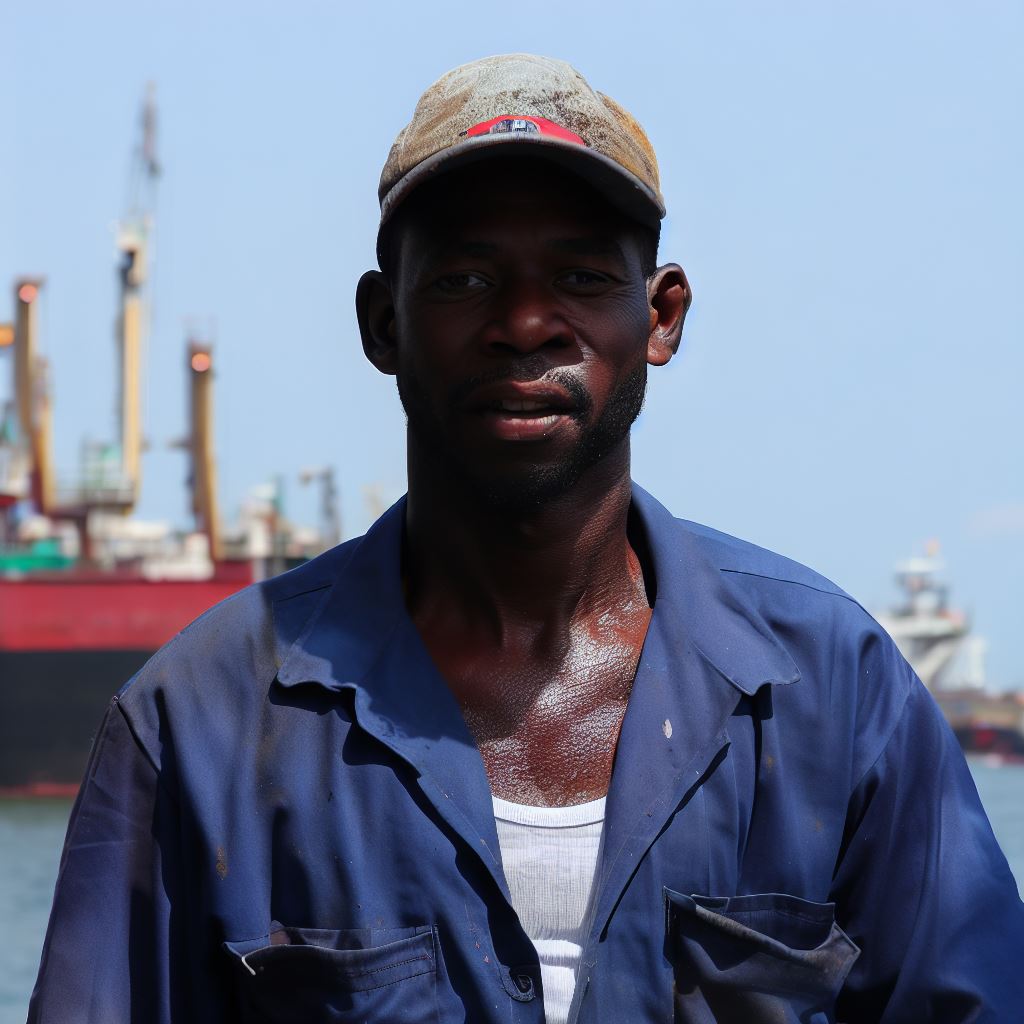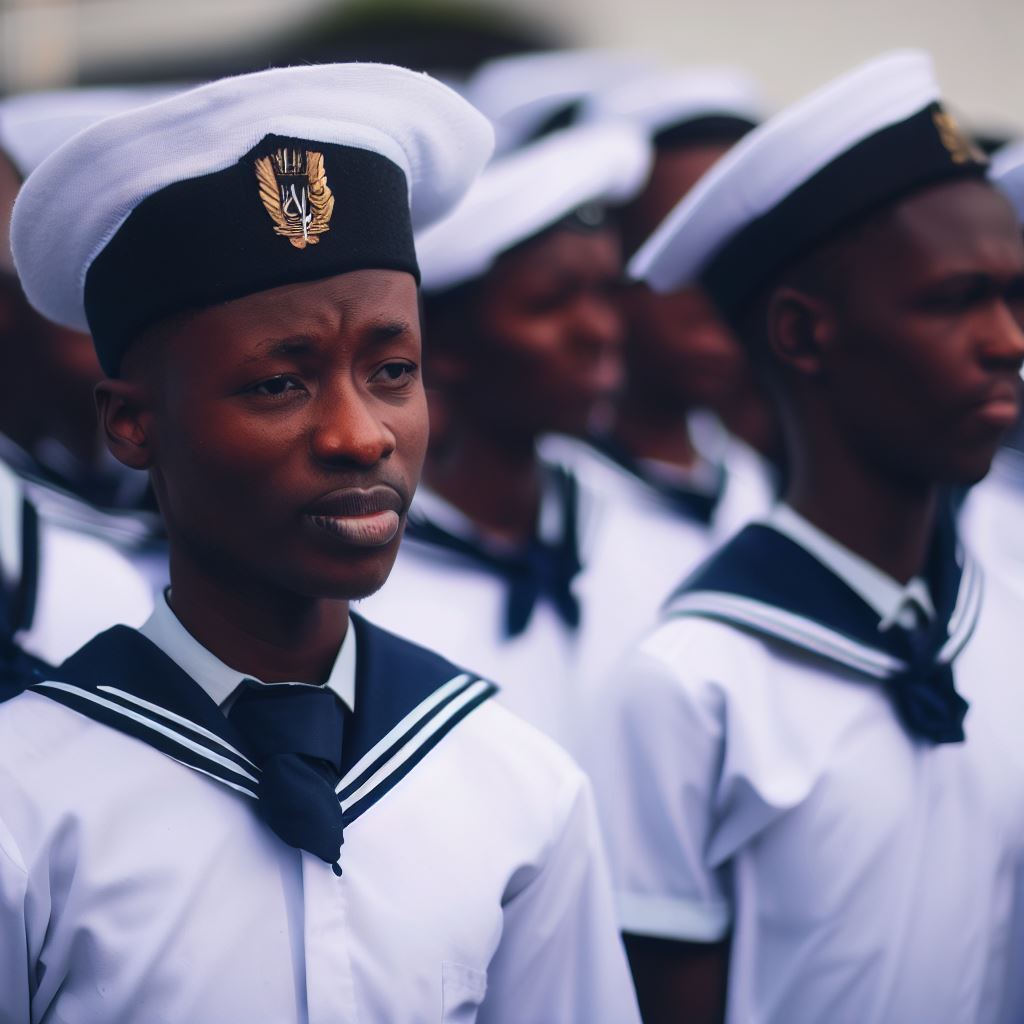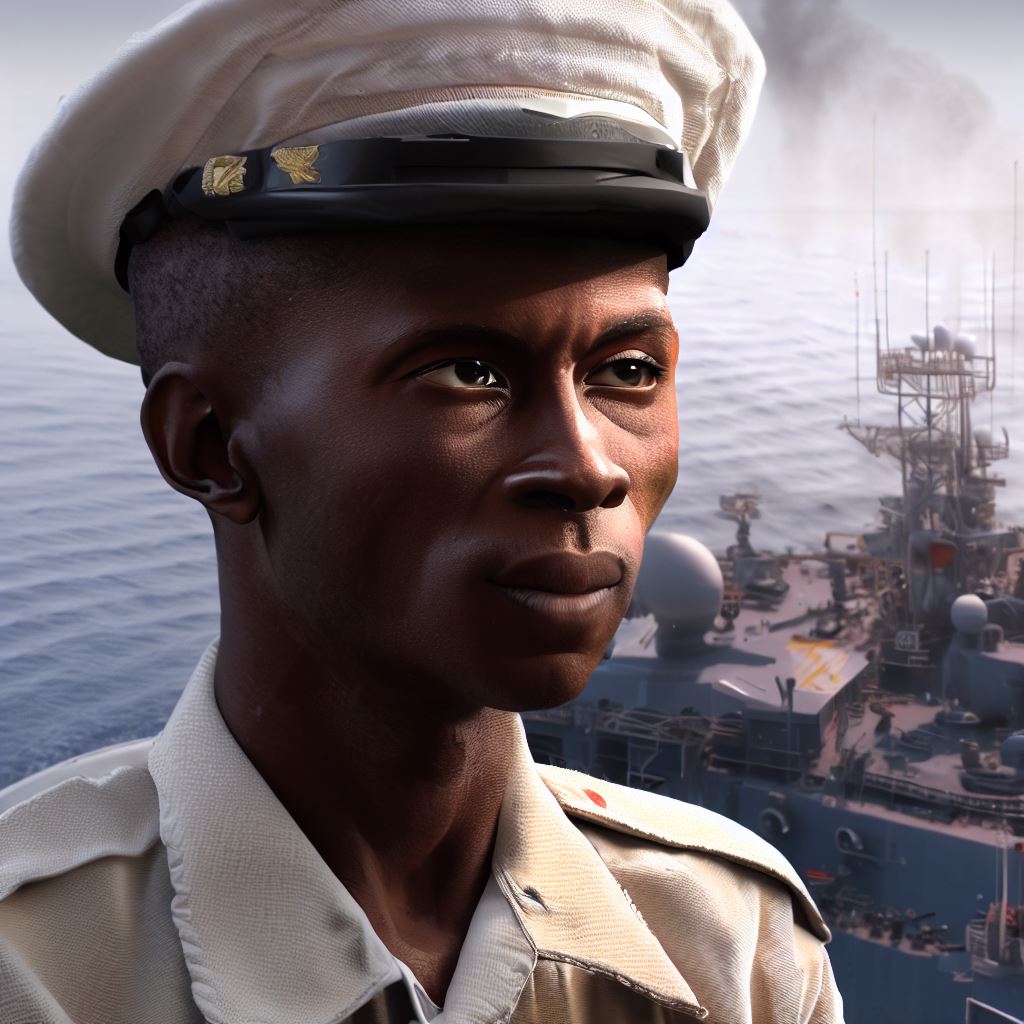Introduction
In the maritime industry of Nigeria, sailors and oilers play a vital role in ensuring smooth operations at sea. They possess key skills that are essential for the effective functioning of ships and vessels.
Brief explanation of the topic
Sailors and oilers are skilled professionals who are responsible for various tasks onboard ships, including navigation, engine maintenance, and cargo operations.
Their expertise is crucial for the safe and efficient transportation of goods and passengers.
Importance of sailors and oilers in Nigeria’s maritime industry
The maritime industry is a significant sector of Nigeria’s economy, as it facilitates international trade and contributes to the country’s GDP.
Within this industry, sailors and oilers hold critical roles that directly impact the smooth running of operations.
Sailors and oilers are trained to handle navigation equipment, ensuring that ships follow correct routes and avoid potential hazards such as rocks or shallow waters.
Their expertise in maintaining and repairing ship engines ensures that vessels operate at optimum efficiency, reducing downtime and increasing productivity.
Sailors and oilers are responsible for cargo handling, ensuring the proper storage, loading, and unloading of goods.
Their knowledge of relevant regulations and safety procedures helps prevent accidents and damage to the cargo.
In addition to technical skills, sailors and oilers must have good communication, teamwork, and problem-solving abilities.
They often work in multinational crews, requiring effective communication and collaboration to carry out tasks efficiently.
In essence, sailors and oilers play a vital role in Nigeria’s maritime industry, contributing to the safe and efficient transportation of goods and passengers.
Their expertise and skills are essential for the growth and development of the industry, ensuring its continued success.
Importance of Physical Fitness
Physical fitness is of utmost importance for sailors and oilers in Nigeria. It is essential for them to maintain a high level of physical fitness in order to perform their duties efficiently and effectively.
Physical demands of the job
- Sailors and oilers are required to perform physically demanding tasks on a daily basis.
- They have to handle heavy equipment, load and unload cargo, and maintain the ship’s machinery.
- Physical fitness helps them handle these demanding tasks with ease and reduce the risk of injuries.
Stamina and strength requirements
- Sailors and oilers need to have a good level of stamina and endurance to cope with the long hours of work.
- They may be required to work for extended periods without breaks, especially during emergencies or in adverse weather conditions.
- Strength is also important for lifting heavy objects and performing manual labor tasks.
Exercises and training to improve physical fitness
- A regular exercise routine is crucial for sailors and oilers to maintain their physical fitness.
- Aerobic exercises like running, swimming, or cycling help improve stamina.
- Strength training exercises such as weightlifting or bodyweight exercises can help build muscle strength.
- Flexibility exercises like stretching or yoga can enhance agility and prevent muscle strains.
Furthermore, sailors and oilers can undergo specific training programs to enhance their physical fitness for their job.
These programs focus on improving endurance, strength, and overall fitness levels related to the tasks they perform onboard.
The training may include drills, simulations, and practical exercises that mimic real-life situations at sea.
Regular physical fitness assessments are also conducted to ensure that the sailors and oilers are maintaining their fitness levels.
In fact, physical fitness is of paramount importance for sailors and oilers in Nigeria.
It enables them to meet the physical demands of their job, possess the required stamina and strength, and perform their duties efficiently.
By engaging in regular exercise routines and undergoing specific training programs, they can maintain and improve their physical fitness levels, ensuring a safe and successful career at sea.
Read: Nigeria’s Marine Industry: Opportunities for Sailors
Navigation Skills
Sailors and oilers in Nigeria need to possess exceptional navigation skills to ensure safe and efficient maritime operations.
These skills encompass a range of abilities, including understanding nautical charts and instruments, reading and interpreting weather conditions, and having knowledge of tides, currents, and navigation rules.
Understanding nautical charts and instruments
Understanding nautical charts and instruments is the foundation of effective navigation.
Sailors and oilers must be capable of comprehending and utilizing these tools to determine their precise location, depth of water, and potential hazards.
Nautical charts provide vital information such as underwater features, aids to navigation, and recommended routes to follow.
Being proficient in utilizing these charts helps sailors and oilers navigate safely and avoid accidents or mishaps.
Reading and interpreting weather conditions
Reading and interpreting weather conditions is also paramount for sailors and oilers in Nigeria.
The maritime environment is constantly influenced by weather patterns, and understanding these conditions is crucial for planning safe voyages.
Sailors and oilers must be able to interpret weather forecasts and observe signs such as cloud formations, wind patterns, and barometric pressure changes.
Accurate interpretation of weather conditions enables them to make informed decisions regarding navigation routes and potential risks, ensuring the safety of the crew and vessel.
Knowledge of tides, currents, and navigation rules
Knowledge of tides, currents, and navigation rules is another essential skill for sailors and oilers.
Tides and currents significantly impact vessel movement, and understanding their behavior is crucial for successful navigation.
Sailors and oilers must be familiar with tide tables and current charts to plan their journeys accordingly.
Additionally, knowledge of navigation rules, such as the International Regulations for Preventing Collisions at Sea (COLREGs), helps ensure safe passage by providing guidelines for vessel maneuvering and avoiding collisions.
In short, navigation skills are vitally important for sailors and oilers in Nigeria.
The ability to understand nautical charts and instruments, interpret weather conditions accurately, and possess knowledge of tides, currents, and navigation rules are essential for safe and efficient maritime operations.
Mastering these skills enhances the professionalism and expertise of sailors and oilers, contributing to the overall success of the maritime industry in Nigeria.
Read: Challenges Faced by Sailors and Oilers in Nigeria Today
Seamanship Skills
Rope Handling and Knot Tying
Sailors and oilers in Nigeria must have proficient rope handling and knot tying skills. These skills are crucial for ensuring the safe and efficient operation of vessels at sea.
Properly handling ropes and tying secure and reliable knots are essential for a variety of tasks onboard.
Ropes are used for a multitude of purposes on ships, such as mooring, securing cargo, and rigging sails.
Sailors and oilers need to be able to properly handle ropes to control the movement of the vessel and perform various tasks.
They must be skilled in coiling, uncoiling, and handling ropes while maintaining the desired tension.
A secure knot ensures that no slippage or looseness occurs, preventing accidents or damage to the vessel. Common knots include the clove hitch, bowline, square knot, and round-turn two half-hitches.
Familiarity with Different Types of Vessels
Sailors and oilers in Nigeria should be familiar with various types of vessels they may encounter in their maritime careers.
Different vessels have distinct characteristics and handling requirements. Understanding these differences is essential for efficient and safe operations.
Cargo ships, tanker vessels, and offshore oil rigs are some examples of vessels sailors and oilers may work on.
Each type has unique features and operational procedures. Familiarity with vessel types allows sailors and oilers to adapt quickly, understand specific safety regulations, and efficiently carry out their duties.
Maintenance and Repair of Equipment and Machinery
The ability to perform maintenance and repair tasks on equipment and machinery is vital for sailors and oilers.
Ships have a wide range of mechanical systems and equipment that require regular inspections, maintenance, and occasionally repairs.
Regular maintenance ensures the smooth and efficient operation of onboard machinery. Sailors and oilers must be skilled in inspecting and maintaining engines, pumps, generators, and electrical systems.
They should have knowledge of troubleshooting common issues and performing minor repairs.
Recognizing and rectifying problems promptly can prevent accidents, equipment failures, and costly delays.
In general, sailors and oilers in Nigeria must possess key skills such as rope handling and knot tying, familiarity with different types of vessels, and the ability to maintain and repair equipment and machinery.
These skills are fundamental for ensuring the safe and efficient operation of vessels at sea.
Read: Working as a Marine Oiler in Nigeria: Tips and Insights
Communication Skills
Effective communication is a crucial skill for sailors and oilers in Nigeria. It plays a vital role in maintaining safety and efficiency on board.
Good communication ensures that everyone understands and follows instructions, preventing accidents and misunderstandings.
Importance of Effective Communication on Board
Clear and effective communication is essential to ensure smooth operations on a ship.
It helps sailors and oilers understand their roles and responsibilities, resulting in better coordination and teamwork.
Miscommunication can lead to errors, delays, and even accidents, putting the crew’s safety at risk.
Understanding and Using Maritime Terminology
Sailors and oilers need to be familiar with maritime terminology to communicate effectively.
Different ship parts, equipment, and procedures have specific names that may not be commonly known outside the maritime industry.
Using correct terminology helps in conveying precise information and avoids confusion among crew members.
Maintaining Clear Communication during Emergencies
During emergencies, clear communication can be a matter of life and death. Sailors and oilers must be able to transmit and receive emergency signals accurately.
Quick and concise communication can help in executing emergency procedures promptly and effectively, ensuring the safety of the crew and the vessel.
To enhance communication skills, sailors and oilers can:
- Practice active listening to understand instructions accurately.
- Ask for clarification if any information is unclear or confusing.
- Speak clearly and confidently, ensuring their message is understood.
- Use appropriate non-verbal communication, such as hand gestures or signals.
- Avoid jargon or technical language when communicating with non-technical crew members.
- Stay calm and composed during high-pressure situations to communicate effectively.
- Familiarize themselves with the International Code of Signals for effective visual communication.
- Participate in communication drills and training sessions to improve their skills and response during emergencies.
- Learn basic foreign language phrases to communicate with international crew members.
In review, communication skills are essential for sailors and oilers in Nigeria. Effective communication ensures the smooth operation of a ship, minimizes risks, and maintains the safety of the crew and vessel.
By actively listening, using maritime terminology, and maintaining clear communication during emergencies, sailors and oilers can excel in their roles and contribute to the success of their maritime endeavors.
Read: The Role of Sailors in Nigeria’s Maritime Economy

Teamwork
One of the key skills required for sailors and oilers in Nigeria is teamwork and leadership skills. This is essential for a smooth operation on board a ship.
Collaborating with fellow crew members
- Collaborating with fellow crew members is crucial for sailors and oilers in Nigeria.
- Working together effectively allows for better communication and coordination on board.
- Sharing responsibilities and supporting one another promotes a harmonious work environment.
- Teamwork also enhances efficiency, ensuring tasks are completed in a timely manner.
- Building strong relationships among team members is important for morale and overall job satisfaction.
Leadership Skills
- Sailors and oilers should possess leadership qualities to effectively manage their responsibilities.
- Taking on leadership roles when necessary demonstrates initiative and confidence.
- Leadership skills enable sailors and oilers to make important decisions and act as problem solvers.
- Being able to adapt to different situations and guide the team contributes to the overall success of the operation.
- A good leader motivates and inspires others to perform at their best, boosting morale and productivity.
Resolving conflicts and fostering a positive work environment are also vital aspects of teamwork and leadership.
Resolving Conflicts
- Conflicts can arise in any work environment, including on board a ship.
- Effective communication skills are necessary to address and resolve conflicts among crew members.
- Listening to different perspectives and finding common ground helps in resolving disputes.
- Seeking assistance from higher authorities when needed ensures fair and unbiased conflict resolution.
Fostering a Positive Work Environment
- Promoting a positive work environment contributes to the overall well-being of the crew.
- Maintaining open lines of communication and encouraging feedback allows for a supportive workplace culture.
- Recognizing and appreciating the efforts and achievements of fellow crew members boosts morale.
- Creating a safe and inclusive environment ensures everyone feels valued and respected.
Most importantly, sailors and oilers in Nigeria require strong teamwork and leadership skills to excel in their roles.
Collaborating with fellow crew members, resolving conflicts, and fostering a positive work environment are crucial for success on board a ship.
Developing these skills not only enhances efficiency and productivity but also contributes to the overall well-being and job satisfaction of the crew.
Safety and Emergency Preparedness
Safety is of utmost importance in any maritime industry, and sailors and oilers in Nigeria are no exception.
To ensure a safe working environment, these professionals must possess key skills and knowledge in safety and emergency preparedness.
Understanding safety procedures and protocols
Understanding safety procedures and protocols is crucial for sailors and oilers. They must be fully aware of all safety regulations and guidelines to prevent accidents and minimize risks.
This includes knowing how to properly operate and maintain safety equipment, as well as following established procedures for tasks such as boarding and disembarking vessels, handling cargo, and working on deck.
Knowledge of first aid and CPR
Another vital skill for sailors and oilers is their knowledge of first aid and CPR. In a maritime setting, accidents and injuries can happen at any time.
Being equipped with the ability to administer basic first aid can make a significant difference in saving someone’s life or preventing further harm.
Sailors and oilers should be trained in assessing and responding to common medical emergencies, such as cuts, burns, fractures, and cardiac arrest.
Firefighting techniques and handling hazardous materials
Firefighting is an essential skill for sailors and oilers due to the inherent risks of fires on ships and offshore installations.
They must be trained in firefighting techniques, including the proper use of firefighting equipment such as fire extinguishers, fire hoses, and fire suppression systems.
Additionally, they need to understand how to respond quickly and effectively to contain and extinguish fires, as well as evacuate personnel if necessary.
Publish Your Professional Profile, Business or Brand
Showcase your expertise, gain trust, and boost visibility instantly on Professions.ng.
Publish NowHandling hazardous materials is another critical aspect of safety for sailors and oilers.
They may come into contact with various types of hazardous materials, including chemicals, fuels, and substances that pose a threat to both human health and the environment.
Understanding the risks associated with these materials and knowing how to handle them safely is essential to prevent accidents, spills, and exposure-related incidents.
All in all, sailors and oilers in Nigeria must possess a range of key skills to ensure safety and emergency preparedness.
These include having a comprehensive understanding of safety procedures and protocols, being knowledgeable in first aid and CPR, having the ability to fight fires using proper techniques and equipment, and knowing how to handle hazardous materials.
By prioritizing safety and continuously developing these skills, sailors and oilers can contribute to a safer maritime industry in Nigeria.
Adaptability and Problem-Solving Skills
Adapting to changing weather conditions and unforeseen situations
Adapting to changing weather conditions is a crucial skill for sailors and oilers as they often encounter unpredictable situations at sea.
Sailors and oilers must be able to handle unforeseen situations with calmness and confidence to ensure the safety of the crew and the vessel.
Ability to troubleshoot and resolve technical issues
The ability to troubleshoot and resolve technical issues is essential to ensure the smooth operation of the ship’s equipment and machinery.
Sailors and oilers should possess problem-solving skills to identify and fix any glitches or malfunctions that might occur during maritime operations.
Quick thinking and resourcefulness are necessary qualities for sailors and oilers to address technical problems efficiently and effectively.
Decision-Making Skills in Critical Situations
Sailors and oilers often face critical situations where they need to make quick decisions that impact the safety and well-being of the crew and the ship.
Having good decision-making skills is essential for sailors and oilers to assess the risks involved in a situation and take appropriate action.
During emergencies, sailors and oilers must make split-second decisions, such as initiating emergency response procedures or providing first aid.
The ability to prioritize tasks and make tough choices in high-pressure situations is crucial for sailors and oilers to effectively handle emergencies.
Sailors and oilers need to consider various factors, such as weather conditions, vessel stability, and crew safety, while making critical decisions.
To sum it up, sailors and oilers in Nigeria require a range of key skills to excel in their roles.
Adaptability and problem-solving skills enable them to handle changing weather conditions and troubleshoot technical issues.
Decision-making skills are vital for making critical choices in high-pressure situations. By possessing these skills, sailors and oilers can ensure the smooth and safe operation of maritime activities in Nigeria.
Find Out More: Developing a Successful Career in Nigeria’s Rail Industry
Conclusion
The maritime industry in Nigeria requires sailors and oilers to possess a variety of key skills.
These skills include navigational expertise, technical know-how, communication proficiency, problem-solving abilities, and teamwork.
By recapitulating these essential skills, it is evident that sailors and oilers play a crucial role in ensuring the smooth operation of maritime vessels.
Furthermore, continuous learning and development are of utmost importance in order to keep up with the evolving demands of the industry.
Finally, it is important to recognize the significance of these skills in the maritime industry as they contribute to the safety, efficiency, and success of maritime operations in Nigeria.




